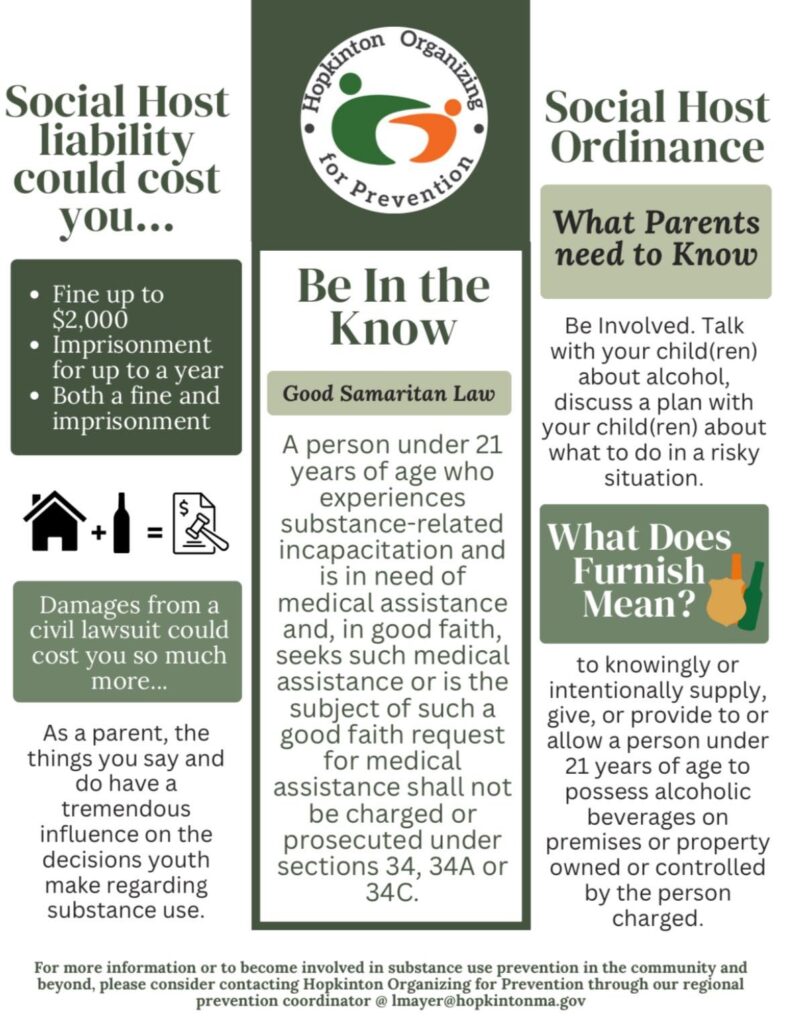The holiday season brings more opportunities to gather and enjoy the company of friends and family. But parties where underage individuals are supplied alcohol or adults overindulge and engage in dangerous behaviors could land hosts in hot water.
This is the message from both the Hopkinton Police Department and Hopkinton Organizing for Prevention. The organizations recently publicized information about Massachusetts’ Social Host Law outlining the responsibilities and liabilities of anyone considering furnishing minors with alcohol.
“This is the biggest time of year for people to get together and celebrate with each other,” said HPD Detective Sgt. Gregg DeBoer.
“We want people to be aware of the ramifications [of this law],” he added.
Under the Social Host Law, any adult or minor who is “in control” of a property and either supplies alcohol or allows it to be consumed by minors on that property can be held responsible, both in criminal and civil courts.
The punishment for violating the law could result in a $2,000 fine, up to a year imprisonment or both.
Social hosts — both adults and minors — can be held civilly liable as well, which could cause significant financial hardship.
This is true even in situations where parents might not be aware an event with underage drinking is occurring on their property. DeBoer said that the HPD has encountered situations where parents were unaware minors were consuming alcohol on their property.
“That’s kind of your responsibility as a parent to know what’s going on at your house,” he said.
He went on to explain that the liability under the Social Host Law mirrors the liability restaurants take on when serving alcohol to customers.
Stressed DeBoer: “Your guests are your responsibility.”
While the law focuses on curbing underage drinking, it does not stop there, according to DeBoer. Under state law, social host liability extends to adults who over-consume and engage in dangerous behaviors, such as impaired driving.
“We want people to enjoy themselves and have a good time, but do it in a responsible way that doesn’t put others at risk,” said DeBoer.
Both the HPD and Hopkinton Organizing for Prevention (HOP) want residents to understand how these laws work and how parents can prevent underage drinking and substance abuse.
“The laws only work if the community is aware of them,” said Lauren Mayer, the regional prevention coordinator at Hopkinton Youth & Family Services. Mayer heads up HOP, which is run as part of the Youth & Family Services department.
“The mission of HOP is to make the community aware of these laws so we can prevent substance abuse,” Mayer said.
HOP has been working on spreading this information through multiple campaigns.
During prom season earlier this year, the organization worked with BoMain Pizza, Bar & Grill to educate restaurant patrons and residents. It placed “tiered pop-ups” featuring information on social host liability throughout the restaurant.
It also is using data gathered from the community to change perceptions about substance abuse.
According to Mayer, surveys sent to parents and students show a disparity between perceived and actual substance use.
“We’re finding the perception that there is more student [substance use], where data is not always proving that to be the case,” she said.
She hopes work done to change those perceptions help “so that students don’t feel a pressure to use.”
Both DeBoer and Mayer assert that the Social Host law is not something to be afraid of. Rather, it is a tool meant to help reduce minors’ access to alcohol and other dangerous situations.
“It’s proven to be one of the best strategies to prevent underage drinking,” said Mayer.

Hopkinton Organizing for Prevention released a flyer detailing how social host liability could impact residents.














Prohibition works. Just look at the 18th amendment.